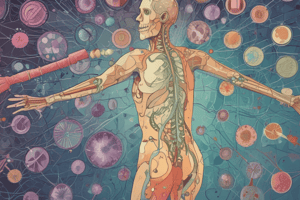Podcast
Questions and Answers
What is the primary difference between a disinfectant and a sterilant?
What is the primary difference between a disinfectant and a sterilant?
- A disinfectant is used on living beings, while a sterilant is only for inanimate objects.
- A disinfectant kills most microbes, while a sterilant kills all microbes. (correct)
- A disinfectant is a chemical, while a sterilant is a physical method.
- A disinfectant kills all microbes, while a sterilant kills most.
Which of the following describes a vector in the context provided?
Which of the following describes a vector in the context provided?
- A type of pathogen that causes disease.
- A method for cleaning contaminated surfaces.
- An agent that transmits a pathogen to another living being. (correct)
- A chemical used to disinfect an area.
What purpose does vector control serve in disease management?
What purpose does vector control serve in disease management?
- To disinfect all surfaces where diseases occur.
- To eradicate agents that transmit diseases. (correct)
- To completely eliminate all diseases from the environment.
- To create vaccines against various pathogens.
Which of the following is an example of sanitation?
Which of the following is an example of sanitation?
What is an example of a method used to control mosquito populations?
What is an example of a method used to control mosquito populations?
Why is sanitation important after a battle scenario described?
Why is sanitation important after a battle scenario described?
Which type of bacteria is vector control primarily concerned with?
Which type of bacteria is vector control primarily concerned with?
What is the primary purpose of a vaccine?
What is the primary purpose of a vaccine?
Which of the following substances can be classified as antiseptics?
Which of the following substances can be classified as antiseptics?
In the context of disease control, what does wearing protective armor represent?
In the context of disease control, what does wearing protective armor represent?
What would be an example of a weapon used in the fight against pathogens?
What would be an example of a weapon used in the fight against pathogens?
Which statement best describes the role of disinfectants?
Which statement best describes the role of disinfectants?
What aspect of disease control is similar to equipping a knife in a video game?
What aspect of disease control is similar to equipping a knife in a video game?
How does a vaccine function in the immune system?
How does a vaccine function in the immune system?
Which of the following is NOT a method of disease control mentioned?
Which of the following is NOT a method of disease control mentioned?
Flashcards
Antiseptic
Antiseptic
A substance that kills or inhibits the growth of microorganisms on living tissue.
Disinfectant
Disinfectant
A substance that kills or inhibits the growth of microorganisms on non-living surfaces.
Vaccine
Vaccine
A preparation containing a weakened or inactive form of a pathogen, used to stimulate an immune response and provide immunity against the disease.
Pathogen
Pathogen
Signup and view all the flashcards
Immune System
Immune System
Signup and view all the flashcards
Sterilization
Sterilization
Signup and view all the flashcards
Disease Control
Disease Control
Signup and view all the flashcards
Infection Control
Infection Control
Signup and view all the flashcards
Sterilant
Sterilant
Signup and view all the flashcards
Vector
Vector
Signup and view all the flashcards
Vector Control
Vector Control
Signup and view all the flashcards
Yellow Fever
Yellow Fever
Signup and view all the flashcards
Sanitation
Sanitation
Signup and view all the flashcards
Study Notes
Disease Control Methods
- Vaccines: A vaccine contains a weakened or partial pathogen, stimulating the immune system to fight the actual pathogen if encountered later, providing protection against disease.
- Antiseptics: Kill microbes on living tissue, used to clean wounds, preventing infection. Examples include alcohol, hydrogen peroxide, and iodine.
- Disinfectants: Kill most microbes on non-living surfaces. They are less powerful than sterilants.
- Sterilants: Kill all living microbes on non-living surfaces. Similar to a powerful "bazooka", they eliminate all risks.
- Vector Control: Methods to eliminate vectors (disease carriers) like insects, some mammals, and birds. This can include removing breeding grounds (like stagnant water) or using chemicals to kill disease vectors. Important in vector-borne diseases like yellow fever.
- Sanitation: Maintaining clean environments through filtering water, treating sewage, removing waste, and neutralizing toxins. This is vital for public health, preventing the spread of disease from contaminated water or waste.
Studying That Suits You
Use AI to generate personalized quizzes and flashcards to suit your learning preferences.
Description
Explore various methods for controlling diseases, including vaccines, antiseptics, disinfectants, and sterilants. Learn about vector control strategies and the importance of sanitation in preventing disease spread. This quiz provides a comprehensive look at the techniques used to maintain public health.




